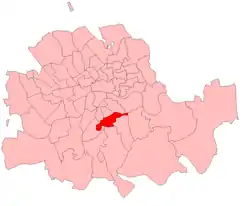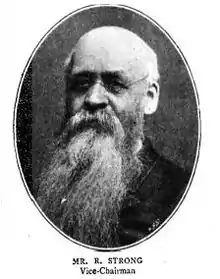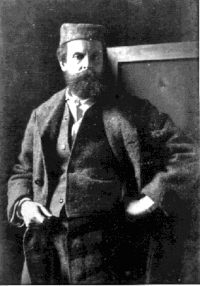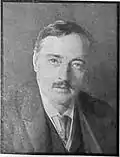Camberwell North (UK Parliament constituency)
Camberwell North was a borough constituency located in the Metropolitan Borough of Camberwell, in South London. It returned one Member of Parliament (MP) to the House of Commons of the Parliament of the United Kingdom. The constituency was created for the 1885 general election, and abolished for the 1950 general election.
| Camberwell North | |
|---|---|
| Former Borough constituency for the House of Commons | |
 Camberwell North in London 1885-1918 | |
 Camberwell North in London 1918-50 | |
| County | County of London |
| 1885–1950 | |
| Number of members | One |
| Replaced by | Peckham |
| Created from | Lambeth |
Boundaries

1918–1950: The Metropolitan Borough of Camberwell wards of Coburg, Marlborough, North Peckham and St George's.
Members of Parliament
Election results
Elections in the 1880s


| Party | Candidate | Votes | % | ±% | |
|---|---|---|---|---|---|
| Liberal | Richard Strong | 3,137 | 51.3 | ||
| Conservative | Wilfrid Blunt | 2,975 | 48.7 | ||
| Majority | 162 | 2.6 | |||
| Turnout | 6,112 | 71.0 | |||
| Registered electors | 8,603 | ||||
| Liberal win (new seat) | |||||
| Party | Candidate | Votes | % | ±% | |
|---|---|---|---|---|---|
| Conservative | John Richards Kelly | 2,717 | 51.1 | +2.4 | |
| Liberal | Edward Hodson Bayley | 2,352 | 44.3 | -7.0 | |
| Independent Liberal Unionist | William Pirie Duff | 246 | 4.6 | New | |
| Majority | 365 | 6.8 | N/A | ||
| Turnout | 5,315 | 61.8 | -9.2 | ||
| Registered electors | 8,603 | ||||
| Conservative gain from Liberal | Swing | +4.7 | |||
Election in the 1890s
| Party | Candidate | Votes | % | ±% | |
|---|---|---|---|---|---|
| Liberal | Edward Hodson Bayley | 4,295 | 55.5 | +11.2 | |
| Conservative | John Richards Kelly | 3,450 | 44.5 | -6.6 | |
| Majority | 845 | 11.0 | N/A | ||
| Turnout | 7,745 | 69.6 | +7.8 | ||
| Registered electors | 11,133 | ||||
| Liberal gain from Conservative | Swing | +8.9 | |||

| Party | Candidate | Votes | % | ±% | |
|---|---|---|---|---|---|
| Conservative | Philip Dalbiac | 4,009 | 54.5 | +10.0 | |
| Liberal | Edward Hodson Bayley | 3,316 | 45.1 | -10.4 | |
| Independent Liberal | Nelson P. Palmer | 32 | 0.4 | New | |
| Majority | 693 | 9.4 | N/A | ||
| Turnout | 7,357 | 66.5 | -3.1 | ||
| Registered electors | 11,064 | ||||
| Conservative gain from Liberal | Swing | +10.2 | |||
Elections in the 1900s

| Party | Candidate | Votes | % | ±% | |
|---|---|---|---|---|---|
| Liberal | Thomas Macnamara | 4,820 | 58.0 | +12.9 | |
| Conservative | Joseph Diggle | 3,485 | 42.0 | −12.5 | |
| Majority | 1,335 | 16.0 | N/A | ||
| Turnout | 8,305 | 67.0 | +0.5 | ||
| Registered electors | 12,397 | ||||
| Liberal gain from Conservative | Swing | +12.7 | |||
| Party | Candidate | Votes | % | ±% | |
|---|---|---|---|---|---|
| Liberal | Thomas Macnamara | 6,314 | 64.4 | +6.4 | |
| Conservative | Charles H Hoare | 3,497 | 35.6 | -6.4 | |
| Majority | 2,817 | 28.8 | +12.8 | ||
| Turnout | 9,811 | 78.4 | +11.4 | ||
| Registered electors | 12,519 | ||||
| Liberal hold | Swing | +6.4 | |||
Elections in the 1910s
| Party | Candidate | Votes | % | ±% | |
|---|---|---|---|---|---|
| Liberal | Thomas Macnamara | 5,593 | 55.4 | -9.0 | |
| Conservative | Sydney Hoffnung Goldsmid | 4,511 | 44.6 | +9.0 | |
| Majority | 1,082 | 10.8 | -18.0 | ||
| Turnout | 10,104 | 84.8 | +6.4 | ||
| Registered electors | 11,918 | ||||
| Liberal hold | Swing | -9.0 | |||

| Party | Candidate | Votes | % | ±% | |
|---|---|---|---|---|---|
| Liberal | Thomas Macnamara | 5,038 | 55.4 | 0.0 | |
| Conservative | Sydney Hoffnung Goldsmid | 4,056 | 44.6 | 0.0 | |
| Majority | 982 | 10.8 | 0.0 | ||
| Turnout | 9,094 | 76.3 | -8.5 | ||
| Registered electors | 11,918 | ||||
| Liberal hold | Swing | 0.0 | |||
General Election 1914/15:
Another General Election was required to take place before the end of 1915. The political parties had been making preparations for an election to take place and by the July 1914, the following candidates had been selected;
- Liberal: Thomas Macnamara
- Unionist: Walter Radford
In 1918 constituency boundaries were changed and a new seat of Camberwell North West was created. Macnamara chose to contest the new seat.
| Party | Candidate | Votes | % | ±% | |
|---|---|---|---|---|---|
| C | Unionist | Henry Newton Knights | 6,010 | 58.0 | |
| Liberal | George Hearn | 2,177 | 21.0 | ||
| Labour | Charles Ammon | 2,175 | 21.0 | ||
| Majority | 3,833 | 37.0 | N/A | ||
| Turnout | 26,416 | 39.2 | |||
| Unionist gain from Liberal | Swing | ||||
| C indicates candidate endorsed by the coalition government. | |||||
Elections in the 1920s
| Party | Candidate | Votes | % | ±% | |
|---|---|---|---|---|---|
| Labour | Charles Ammon | 7,854 | 53.9 | +32.9 | |
| Unionist | Richard Meller | 6,719 | 46.1 | -11.9 | |
| Majority | 1,135 | 7.8 | N/A | ||
| Turnout | 28,709 | 50.8 | +11.6 | ||
| Labour gain from Unionist | Swing | ||||
| Party | Candidate | Votes | % | ±% | |
|---|---|---|---|---|---|
| Labour | Charles Ammon | 8,320 | 50.8 | +29.8 | |
| Unionist | Helen Gwynne-Vaughan | 8,066 | 49.2 | -9.2 | |
| Majority | 254 | 1.6 | N/A | ||
| Turnout | 16,386 | 56.7 | +5.9 | ||
| Labour gain from Conservative | Swing | -13.4 | |||
| Party | Candidate | Votes | % | ±% | |
|---|---|---|---|---|---|
| Labour | Charles Ammon | 10,620 | 64.2 | +13.4 | |
| Unionist | Helen Gwynne-Vaughan | 5,934 | 35.8 | -13.4 | |
| Majority | 4,686 | 28.4 | +26.8 | ||
| Turnout | 16,554 | 56.9 | +0.2 | ||
| Labour hold | Swing | +13.4 | |||
| Party | Candidate | Votes | % | ±% | |
|---|---|---|---|---|---|
| Labour | Charles Ammon | 11,300 | 54.9 | -9.3 | |
| Unionist | Helen Gwynne-Vaughan | 7,564 | 36.7 | +0.9 | |
| Liberal | Victor Diederichs Duval | 1,729 | 8.4 | New | |
| Majority | 3,736 | 18.2 | -10.2 | ||
| Turnout | 20,593 | 69.7 | +12.8 | ||
| Labour hold | Swing | -5.4 | |||
| Party | Candidate | Votes | % | ±% | |
|---|---|---|---|---|---|
| Labour | Charles Ammon | 13,051 | 57.9 | +3.0 | |
| Unionist | Leo St. Clare Grondona | 5,228 | 23.2 | -13.5 | |
| Liberal | Henry James Edwards | 4,244 | 18.8 | +10.4 | |
| Majority | 7,823 | 34.7 | +16.6 | ||
| Turnout | 225,23 | 63.0 | -6.7 | ||
| Labour hold | Swing | +8.3 | |||
Election in the 1930s
| Party | Candidate | Votes | % | ±% | |
|---|---|---|---|---|---|
| Conservative | Arthur Bateman | 10,634 | 51.9 | +28.7 | |
| Labour | Charles Ammon | 9,869 | 48.1 | -9.8 | |
| Majority | 765 | 3.8 | N/A | ||
| Turnout | 20,503 | 58.3 | -4.7 | ||
| Conservative gain from Labour | Swing | ||||
| Party | Candidate | Votes | % | ±% | |
|---|---|---|---|---|---|
| Labour | Charles Ammon | 11,701 | 64.7 | +16.6 | |
| Conservative | Thomas Martin | 5,924 | 32.8 | -9.1 | |
| Independent Radical Reform | Thomas Frederick Rhodes Disher | 451 | 2.5 | New | |
| Majority | 5,777 | 31.9 | N/A | ||
| Turnout | 18,076 | 55.6 | -2.7 | ||
| Labour gain from Conservative | Swing | ||||
General Election 1939/40
Another General Election was required to take place before the end of 1940. The political parties had been making preparations for an election to take place and by the Autumn of 1939, the following candidates had been selected;
- Labour: Charles Ammon[3]
- Conservative: Edward Rudolph Mayer
Election in the 1940s
| Party | Candidate | Votes | % | ±% | |
|---|---|---|---|---|---|
| Labour | Cecil Manning | 2,655 | 79.8 | +15.1 | |
| Independent | Thomas Frederick Rhodes Disher | 674 | 20.2 | New | |
| Majority | 1,981 | 59.6 | +27.7 | ||
| Turnout | 29,661 | 11.2 | -44.4 | ||
| Labour hold | |||||
| Party | Candidate | Votes | % | ±% | |
|---|---|---|---|---|---|
| Labour | Cecil Manning | 7,186 | 76.6 | +11.9 | |
| Conservative | Edward Rudolph Mayer | 1,394 | 14.9 | -17.9 | |
| Independent National | Thomas Frederick Rhodes Disher | 794 | 8.5 | New | |
| Majority | 5,792 | 61.7 | +29.8 | ||
| Turnout | 15,506 | 60.5 | +4.9 | ||
| Labour hold | Swing | ||||
References
- British Parliamentary Election Results 1885-1918, FWS Craig
- Debrett's House of Commons & Judicial Bench, 1901
- Report of the Annual Conference of the Labour Party, 1939
- Leigh Rayment's Historical List of MPs – Constituencies beginning with "C" (part 1)
- British Parliamentary Election Results 1885-1918, compiled and edited by F.W.S. Craig (Macmillan Press 1974)
- Debrett’s Illustrated Heraldic and Biographical House of Commons and the Judicial Bench 1886
- Debrett’s House of Commons and the Judicial Bench 1901
- Debrett’s House of Commons and the Judicial Bench 1918
